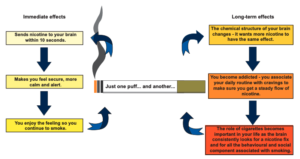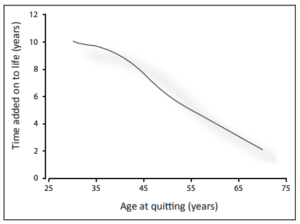Smoking and the lungs
What does smoking do to my lungs?
1. Damage the airways
- Your airways will become inflamed.
- The little hair like structures, called cilia, that usually move back and forth to sweep particles out of the airways will stop working normally.
- Your large airways will produce more mucus, which can cause a chronic cough. This is called chronic bronchitis and is part of chronic obstructive pulmonary disease (COPD). You will cough and produce phlegm most of the time.
- The evidence indicates a higher prevalence of asthma particularly among female smokers compared with female nonsmokers, the asthma prevalence being approximately two-to three-times higher for smokers.
2. Worsen quality of life
Coughing: After being a smoker for a while, you will begin to experience smokers cough, because your body uses this as a way to try and get rid of the toxins you inhale while smoking.
- Airways get narrower and this makes it more difficult for air to flow in and out.
- You will have problems breathing and will often feel short of breath, which is an important symptom of chronic obstructive pulmonary disease (COPD).
- The air sacs in your lungs, called alveoli, will gradually be destroyed.
- The oxygen that you breathe in is transferred from the alveoli into your bloodstream, so if alveoli have been destroyed, the lungs are less able to provide the body with oxygen. This is called emphysema, which is another part of COPD.
- Activities where breathing is important, such as sports, dancing or singing, will become more and more difficult.
- If you continue to smoke you may even become breathless at rest
- Less oxygen for your brain: Lower oxygen in your blood also causes the brain to get less oxygen than it needs to function optimally. This may cause you to have a worse than average ability to focus on things.
3. Cause death
- 90% of all deaths from COPD are caused by cigarette smoking.
- 90% of lung cancer deaths in men and almost 80% of lung cancer deaths in women are caused by smoking, as the toxic substances contained in cigarette smoke can cause cells in the airway to become malignant.
- Smoking not only damages your lungs, but also many other vital parts of your body. It causes bad breath, accelerates skin aging, reduces fertility,causes impotence, cataracts, and poor bone mineral density.
Passive smoking
Nonsmokers who are exposed to secondhand smoke are inhaling many of the same cancer-causing substances and poisons as smokers. Non-smokers are at very low risk of developing lung cancer, but exposure to second hand smoke increases the risk by 20-30%.
Why is nicotine so addictive?

How will my lungs benefit if I stop smoking? How soon will I notice these benefits?
There are many health benefits to stopping smoking and not just to your lungs.
Immediate benefits
Levels of toxic substances that are carried to your lungs in cigarette smoke will drop to those of a non-smoker within a few days, which means: Your lungs will be able to take in more oxygen, which will make it easier for you to breathe and you will feel more energetic.
Benefits after a few weeks
Your airways will become less inflamed, which means you will:
- Cough less.
- Produce less phlegm.
- You will gradually find it easier to exercise.
Long-term benefits
- Long-term damage to your lungs will stop the moment you give up. Severely damaged lungs cannot return to normal, but by quitting before serious damage is done, you can prevent diseases such as COPD and/or asthma getting worse. If you remain cigarette-free for long enough you will:
– Reduce your risk of being severely breathless and disabled or dying from COPD.
– Reduce your chance of developing lung cancer.
– After 15–20 years, the risk of lung cancer is reduced by 90% compared with people who continue to smoke
How can I tackle the habit?
No-one pretends giving up smoking is easy, but if you have made up you mind to quit YOU CAN SUCCEED. Set a ‘quit date’. Use simple tricks to reduce your urge to smoke and help you quit. Look for triggers and plan to avoid them. Find new ways of thinking, behaving and feeling.
- Remind yourself why you gave up smoking in the first place.
- Move away to another place where people aren’t smoking.
- Keep busy to distract your mind: daily exercise is a good ‘distraction’ to promote continued abstinence, while counteracting weight gain.
- Drink plenty of water.
- Take deep breaths
- Beware: Some triggers for smoking only reveal themselves after you try to live without cigarettes.
- Method: Tricks that work for some people may not work for others, so quitting can involve trial and error.
- Ask for help: Ask your doctor, pharmacist, clinical pyschologist, or nurse for help. Contact a telephone or internet helpline.
- Keep going: The most important thing is to be determined and to persist.
The number of years added to life when quitting at different ages

No matter how old you are, you can still extend your life by giving up smoking. However, the younger you are when you give up, the more years you can add on to your life. (Graph reproduced from [Smoking cessation: a clinical update. European Respiratory Review. 2008; 110; 200]).
If at first you don’t succeed, try again…
Nicotine addiction is very powerful and so only 5–10% of ‘quit attempts’ are successful. Withdrawal symptoms, such as craving, anxiety, irritability, lack of concentration, inability to sleep, mood swings, hunger and headache, that occur when the brain is looking for a new fix of nicotine, are a common reason for relapsing and treatment can help this.
Treatment options
Nicotine replacement products such as gum or patches can help relieve withdrawal symptoms by delivering small, measured doses of nicotine into your body. Strong evidence shows that anti-smoking medications can double or even triple your chances of being able to quit.
An alternative treatment which doctors recommend for heavy smokers are non-nicotine drugs, such as buproprion SR (Zyban) and varenicline tartrate (Chantix). They are also effective in relieving the cravings and withdrawal symptoms. Nortryptiline is a cheap, generic drug that works as well as bupropion. The idea of taking a drug to kick a drug habit can make people nervous. Some fear unpleasant side effects, while others fear that one addiction will replace another. But smoking is so dangerous for your health that, if you weigh up the options, (i.e. taking medication or continuing to smoke), using drugs to help you give up smoking will almost always be safer.
Don’t feel bad if it takes you more than one attempt
There is no ‘cure’ for smoking; it’s more like managing a chronic disease. Most people go through cycles of stopping and re-starting the habit, which reflects the strength of your addiction. It is not failure. The good news is that:
- Each time you try to give up you are more likely to succeed as you learn from your experience.
- Counselling increases your chances.
- Medication increases your chances.
- Combining counselling and medication is the most effective.




